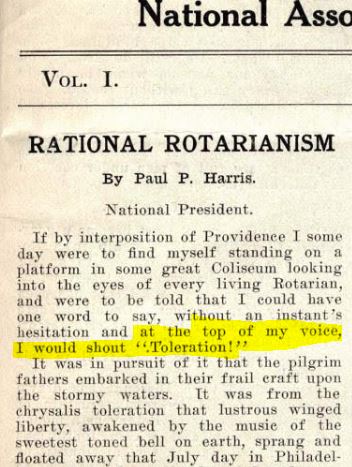 OK, I'm old but not THAT old... Am I yearning for "the simplicity of the olden days"? Why would I bother to look up, not to mention read, a Rotary newsletter which was printed some 107 years ago? Am I progressing towards being the proverbial "crusty old Rotarian" (don't say anything, Andy!) who wishes the current age of Multi Media, 15 second TV media grabs and 'fake news' would simply go away? No, all I did was using the very technology of today, wanting to look up the current 'Rotarian' magazine for quite a different purpose. Since I'm basically lazy, I simply googled it. And, there it pops up: starting with the first issue of January 1911...
OK, I'm old but not THAT old... Am I yearning for "the simplicity of the olden days"? Why would I bother to look up, not to mention read, a Rotary newsletter which was printed some 107 years ago? Am I progressing towards being the proverbial "crusty old Rotarian" (don't say anything, Andy!) who wishes the current age of Multi Media, 15 second TV media grabs and 'fake news' would simply go away? No, all I did was using the very technology of today, wanting to look up the current 'Rotarian' magazine for quite a different purpose. Since I'm basically lazy, I simply googled it. And, there it pops up: starting with the first issue of January 1911...At the time, in its leading article, Paul Harris, the founder of Rotary, cried out for more tolerance. As the famous French proverb states: 'Ça plus ça change, plus ce la même chose...' (the more things change, the more they stay the same).
OK, so Rotary is not supposed to be political, religious or whatever. But we are expected to be leaders in the community and as such we are expected to have a rational opinion and be prepared to not only publicly state it but, if required, defend it. My humble view is that today's society is divided into two major camps: On one side are those who are far too busy to run their lives, their business and look after their families, rather than agitate about things that really don't matter (such as the recent kerfuffle about two Au-Pairs being granted visas). On the other side are those who will do just about anything to milk a minor side step, omission or slip of the tongue for everything it's worth. The latter are, I'm sure, in the minority, but because people like to read, hear and view controversial stuff, those stories get oxygen. And yes, most of the time we may be in the former, but on occasion, if "the other side" slips up, aren't we conveniently and unthinkingly changing to the latter?
By the way: the article is quite relevant and worth reading, even though it was written over 108 years ago. The language is beautiful and descriptive, which is sadly absent in most of today's publications. Click here to access it.

